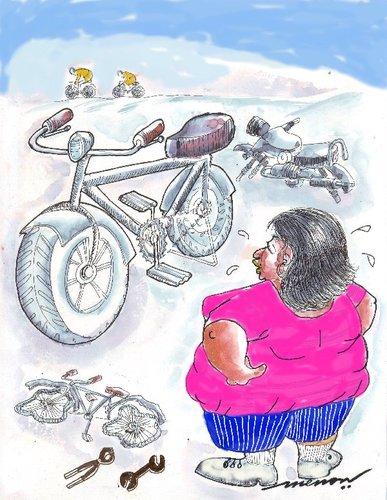Saturday 31 December 2011
Friday 30 December 2011
Thursday 29 December 2011
Wednesday 28 December 2011
Tuesday 27 December 2011
Monday 26 December 2011
Sunday 25 December 2011
Saturday 24 December 2011
Friday 23 December 2011
“They” Get It Wrong Again!!

The IWF (Internet Watch Foundation) of the United Kingdom is a self-regulatory organization founded 15 years ago. The outfit is engaged in fighting child sexual abuse content in the web. Internet Watch Foundation has partnership with police, government and the entire Internet industry. In other words, it has the authority to impose specific measures against online services that facilitate the spreading of kids pornography. This is not hard to do because all largest Internet service providers in the United Kingdom are subscribed to it. Nevertheless, Internet Watch Foundation doesn’t always hit the nail on the head, and that’s what it did in the case of file-hosting service called Fileserve.
Originally, the access to the file-hosting service was blocked by British Internet service providers. The reason was that a specific link was mistakenly believed to lead to child abuse images. The outfit explains on its site that it addresses potentially criminal activity, because the material can only be confirmed to be truly criminal by the court. The part of IWF’s function is to provide partners with an accurate and current URL list to make them able block child sexual abuse material. Fortunately, later Internet Watch Foundation has reconsidered its decision in this case.
According to media reports, after the outfit blocked the service, British Internet users could not either access their personal files or download other files. Unsurprisingly, they weren’t quite happy about the blocking of the service they used. At the same time, they had no idea who to blame for the problem, so they had nothing left except for complaining to their Internet service providers. In a few days, the file-hosting service posted a clarifying message which explained that the Internet Watch Foundation had recently introduced some changes that might affect users’ download ability on the service.
With the time passing and Internet piracy developing more rapidly, means and reasons for blocking access to online services have become very hot and debatable issues. Moreover, in the wake of the effort of the government of the United States to introduce the already infamous anti-piracy legislation known as the SOPA (Stop Online Piracy Act), the word “censorship” seems to become flammable as always causing waves of protests on the Internet, and is likely to be seen in the streets, too.
Thursday 22 December 2011
Bum Wipes?

3 face prison time in special toilet paper scam
Federal prosecutors in Florida say at least three people working for a septic tank company duped customers into buying about $1 million in unnecessary products - in some cases enough toilet paper to last more than 70 years.
More than a dozen customers were told they needed special toilet paper to avoid ruining their septic tanks because the federal government changed regulations on toilet paper. The federal government does not regulate septic tank products.
The trio pleaded guilty in federal court to conspiring to commit wire fraud.
The Miami Herald reported ( http://bit.ly/uNgbS7 ) that they worked for FBK Products. A phone number for the Riviera Beach-based company was not working Saturday.
The trio faces up to two decades in prison when they are sentenced in February.
Wednesday 21 December 2011
Honest…It Was A Ghost!!

Thief suspect pins blame on 'ghost'
A man suspected of theft has blamed a ghost for the crimes.Joseph Hughes from Mount Gilead, Ohio was accused of stealing a generator, a welder and 12 air conditioning units from the sheriff's office in Morrow County.
The stolen items were found in the ex-police officer's basement.
Hughes told the court: "It's going to sound kind of ridiculous, but we believed that there was some paranormal presence in the basement.
"It sounds kind of ridiculous, but there was evidence to support it."
The prosecutor responded: "I've been practising since 1983, and I can say that's the first time I've heard of paranormal activity in the course of a trial."
Hughes was found guilty of 18 charges.
Tuesday 20 December 2011
Forgetful?

Police charge man over suitcase of cash left in cafe
A man who left a suitcase stuffed with nearly A$1 million (626,112 pounds) in cash in a Sydney cafe, and was then found dazed and sitting in the rain, has been charged with a number of offences, police said on Friday.Staff at the cafe in the inner-western Sydney suburb of Burwood noticed the unattended suitcase early on Tuesday after the man came into the cafe but then became nervous and left.
To their surprise the suitcase contained almost A$1 million in cash. Local media said the money ranged from A$100 notes to A$5 notes, bundled into various amounts.
A few hours later police found a 49-year-old man in a dazed condition, sitting in the rain wearing a yellow singlet, surf shorts and red flip-flop sandals.
Police allege he assaulted three officers shortly after he was taken into custody.
The man was then taken to hospital for treatment. He was returned to police custody on Thursday, when he was charged with dealing with the proceeds of crime, assaulting police and two other charges.
This was the second time this year that bags stuffed with large amounts of cash have been left unattended in Sydney.
Monday 19 December 2011
Anywhere To call “Home”?

Polish squatters 'move in' to affluent London area 'because rents are too high'
A group of Polish squatters have taken up residence in a £1m home in one of London's most affluent areas because "rents are too high" for them to afford to live in the area.
The six squatters "moved in" to the Victorian home in Highgate, north London, a fortnight ago.The home is located a short distance from homes owned by Kate Moss, the model, and actor Jude Law.
They even put a sign up in the window stating that they are claiming squatter's rights and do not intend to move until rents in the area fall.
Figures show that rent for a five bed home costs about £5,000 a month.
One 24-year-old squatter told a local newspaper: "There are so many empty big buildings not in use - it's a big waste.
"We can't afford to pay rent in this area and have enough money to live on, so squatting is the solution."
The £1m property is believed to be in the process of renovation.
But locals say that builders downed tools after the owner told them he couldn't afford the work until the recession ends.
One local, who did not want to be named, said he had spoken to the six Polish squatters and told them the owner had been informed of their "occupation".
He said: "The house was bought a couple of years ago and was being done up, but work has stopped since the recession bit.
"I spoke to the squatters who said they wanted to stay in the area, but couldn't afford the rents so just moved into this empty house."
He added: "They don't cause too much of a problem, but this is a nice area where people pay millions of pounds for their homes and don't want to see a bunch of squatters moving in."
Sunday 18 December 2011
Stripper’s Too Blue Plaque!

English Heritage plans a really 'blue' plaque for stripper
It gives a whole new meaning to the term blue plaque – English Heritage wants to install one of its honours outside the home of a famous stripper.
She was a pioneering performer whose daring routine pushed back the boundaries of public decency in 1940s Britian.But a plan to honour Phyllis Dixey, the first stripper to appear in London's West End, with an English Heritage blue plaque has met with fierce resistance.
The government agency wants to place the award outside Dixey's former home in an art deco mansion block in Surbiton, the district which became a byword for suburban respectability when it featured in the 1970s comedy The Good Life.
However, the plan has run into opposition from residents of Wentworth Court concerned about the attention the plaque would bring to the building.
Dixey, a music hall entertainer, lived in the block during the late 1930s, just before she found fame as the "Queen of Striptease".
Her early shows attracted the attentions of police and authorities but were eventually tolerated and her performances at the Whitehall Theatre became a fixture of wartime and post-war London.
The wording of the proposed plaque is: "Phyllis Dixey 1914 to 1964, Striptease Artiste lived here in flat number 15."
English Heritage has contacted all residents in the block to get permission, but they have so far refused to grant it.
The residents' association has suggested to English Heritage a different form of words, such as "burlesque" dancer - but its request has been turned down, on the grounds that burlesque describes an American tradition.
Nigel Bruce, the head of the residents' association, said: "Eyebrows were raised when it was discussed at the AGM. Part of the concern was the title that they were thinking of putting on the plaque.
"It would certainly raise the eyebrows of passers-by."
He added: "We have asked if there is any other wording we could have in its place."
Mr Bruce said the association was still considering the matter and that a consultation process had just finished.
One resident opposed to the plaque said: "The word striptease leads you to a certain visual image. I know that is her history, but I would want it to be said in the nicest way possible.
"People would go 'It's the stripper building.'"
Dixey's family are also opposed to the plan, saying the current wording gives a unfortunate impression of their relative. They are also calling for English Heritage to change the wording.
Oliver Dixey, 34, from Pill, near Bristol, whose grandfather was the dancer's brother, said: "It has upset some of the family. To be fair, she was a stripper. There are no bones about it. But we would prefer for her to be called a fan dancer.
"A stripper in 2011 is completely different to what it was when she was doing it. We don't want her portrayed in the same way."
The Wentworth Court residents' association now say they want to support the wishes of the family.
English Heritage's blue plaques panel, which includes Stephen Fry, the broadcaster, shows no signs of backing down.
Minutes from a meeting say: "Having revisited the various options, the team remained confident that the original proposed inscription offered the most accurate description of Dixey's occupation and should be retained."
They are being supported by the British Music Hall Society, which proposed the plaque in the first place. Terry Lomas, from the group, said: "I do understand residents' concerns, but 'striptease artiste' tells what she did.
"Burlesque wouldn't work, and fan dancing was just one of the things she did. She would love to be named as an actress, but that is too bland - and she wasn't a very good one."
An English Heritage spokesman said negotiations were still going on with the owners and the family over the wording.
"We always get consent for plaques from the owners," she said. "Often people are very happy to do it, but in this instance, we are just not getting that from the owners.
"It is about how to describe Dixey's occupation. We want to represent exactly how she was seen, otherwise you lose the meaning of it."
The process by which plaques are awarded is rigorous. In Dixey's case, it has lasted almost nine years since the application for an award was first lodged.
The panel commissions researchers to investigate the historical worth of proposed candidates before deciding whether to go ahead with a plaque.
In the 1930s, prior to Dixey's innovation, the display of nudity in West End theatres was restricted to displays of motionless women, under a ruling by the Lord Chamberlain summed up as "If you move, it's rude".
After her heyday in the 1940s with The Whitehall Follies and the Peek-a-Boo revue, Dixey's star waned as fashion changed and – as she saw it – more coarse nude shows took away her audience. She eventually fell into poverty and was declared bankrupt.
She later worked as a cook and died of cancer in 1964 at the age of 50. Her life was portrayed in the 1978 film The One and Only Phyllis Dixey, starring Lesley-Anne Down.
Saturday 17 December 2011
Friday 16 December 2011
God Dog It!!!!
'Jesus Christ, Benton': swearing dog owner
A dog walker in Richmond Park had to expend a little more energy than planned after his canine companion called "Benton" took more than a passing interest in the park's wildlife.
The smartphone clip begins with the amateur cameraman admiring some of the Royal park's majestic deer on a seemingly perfect autumnal day.But the serene south west London tableau is soon pierced with several cries of "Benton!", each cry growing ever louder.
The lens is soon drawn to the direction of the commotion and captures a spooked herd of deer gathering pace as the tone of the cries turns ever more exasperated and blasphemous.
With the deer continuing off into the distance the cause of the tumult hoves into view; Benton the dog giving full chase to the herd as his owner chases him in turn, his calls still unheeded as the person capturing the scene lets out a snigger as the video ends.
The owner, who has not been identified, repeatedly yells his pet’s name with little effect as it chases the deer through the popular south-west London park.
As more than 20 deer run off in the distance, the middle-aged man, dressed in a cap, jeans and a brown jacket, is heard cursing the inquisitive dog as it races off in the distance.
The cheeky pet then causes the deer to run across the busy road that cuts through the park, forcing vehicles to stop.
Thursday 15 December 2011
Facebook….Just Another Sheep!!

Facebook’s Censorship
After there emerged a massive fuss about numerous insensitive “joke” pages created on Facebook, the company has given up and deleted groups that make light of rape.Originally, the social network refused to remove these pages, saying that the poor-taste jokes were not a sound reason to go that far. However, the observers argued that these pages are pro-rape and are more than just a joke, as they encourage victimization, making light of a very serious crime. Finally, Facebook has given in to pressure and announced that there was no place on their site for hateful, threatening, and inciting violence material. The company promised to take reports of offensive material very seriously, but they also wanted Facebook to remain a place for people to openly discuss issues and express their views, at the same time respecting the feelings of others.
Undoubtedly, this is a very difficult subject, as there are two sides to the story now: while the pages in question are offensive as intended, it is yet another victory for censorship. The company launched new administrator tags to enable page owners mark their groups as jokes. This will give them a chance to more likely stay operational as long as they are marked as humorous or satire.
The question remains not about the reasons for Facebook to refuse removing the bad jokes, because it’s really unlikely the company was harboring pro-rape gangs, but about the company’s power over censorship in the first place. The critics do remember the Boycott BP group in 2010, whose page quickly gained hundreds of thousands of members and later disappeared almost at random through account deactivations. Later, the company claimed that it had “accidentally” deleted the 800,000 strong page. By the way, the company’s removal of pages is not written in their terms and conditions, so it appears that Facebook’s policy is mostly based on politics, profit and private interest. It was in the run up to the last general election in the United Kingdom, when the reports emerged about Facebook killing anti-Conservative pages because of “breaching” terms and conditions.
In other words, Facebook should introduce a transparent policy about its wide-reaching terms and conditions, and explain why the company is selectively exercising its power in removing single pages without explanation.
Wednesday 14 December 2011
Piracy….Not In Spain!

Spanish Court Found Piracy Harmless
A Spanish judge handed down an interesting ruling in a case involving sale of pirated copies: the defendant doesn’t have to pay damages to the right holder,because it is impossible to determine the extent of the damage to sales. The judge also suggested that piracy may increase sales.Anyone who believes that piracy only harms or only benefits the authors is wrong. Digital piracy has different effect in each case, which is stipulated not only by different areas of the media industry – gaming, music, reading, or movie – but it also depends on a level of popularity and target audience. Indeed, there are a lot of cases in which digital piracy has had a positive effect on sales, as studies have revealed that the “pirates” turned out to be the best customers in the music industry. The spokesperson for EMI record label confirmed that there’s evidence that file-sharing may be useful rather than harmful. He also admitted that maybe the industry shouldn’t oppose file-sharing all the time.
Although his assumptions are a rare event for large bumps in the music industry, he wasn’t the only person speaking this way. In recent months, several people in the anime and publishing industries came to similar conclusions. This idea didn’t go unnoticed among lawyers either – the above mentioned judge from Spain pointed out in his ruling that the damage couldn’t be defined because it was unclear how many people would have been willing to purchase the product at the initial price. He said that people were likely to buy a cheap pirated copy than the original for $20-30.
According to the judge, instead of harming to the copyright holders, piracy can help sales. He said it’s possible that the potential buyer only wants to try the content before purchasing it legally. Thus, file-sharing may help legal publications. “I declare that in this case there was no harm done for which compensation would be possible,"- concluded the judge in his decision.
Despite the fact that similar conclusions had been reached in many studies before, it’s the first case where a judge was speaking in a similar way. In our era with human rights violated in order to protect the interests of a few media companies with a turnover of millions of dollars, people need a more realistic, balanced and independent view of the real consequences of digital piracy.
Tuesday 13 December 2011
Doggie Booze!

Beer for dogs goes on sale
Everybody knows you shouldn't give your dog a sip of your beer, but pooches no longer have to miss out -- because a new brew made specifically for dogs has gone on sale.Bowser Beer really is a beer made for dogs. But unlike your Stella Artois it won't get them drunk and it's designed with their digestive system in mind.
While the beer contains the same malt barley brewers use, the vitamins are good for shiny coats, the hops (which are dangerous to dogs) are replaced with beef or chicken.
As for the taste, it's described as being a "beefy-malty broth" which most dogs lap it up either straight out of the bottle or over ice or their food.
Makers said they came up with the idea for a dog beer after making a pretzel for dogs and thinking that it would be good if they could wash it down with a beer.
Jenny Brown of '3 Busy Dogs' said: "It's like a non-alchoholic beer and contains malt like beer. People drink with their dogs and they love the malty taste so here's something tailored to their digestive needs."
Monday 12 December 2011
Sunday 11 December 2011
Pussy…..Wash

Kitten survives washing machine spin cycle
A kitten called Scampi was close to drowning after he climbed into a washing machine moments before it was put on a spin cycle.
The inquisitive eight-week old ginger and white cat hopped into the washing machine when his owner Frances Leate, 29, left the room to collect some laundry.Frances, of Colchester, Essex placed more clothes into the drum and switched the load on for a 40-degree wash.
The mum-of-one was texting friends when she suddenly realised Scampi was not about and a "feeling in the pit of her stomach" told her that the tiny terror in the wash.
She rushed into her kitchen to be confronted with the awful sight of the the washing machine filling with water before starting to spin.
The hysterical mum switched the machine off but the water remained in the drum and she watched her beloved kitten "drowning" in front of her because the automatic lock initially prevented her from opening the door.
Frances dashed outside and frantically knocked on her neighbour Pam Morris' door and the pair finally managed to pull the sodden and lifeless moggy from the machine.
Frances said: "I could see his little body squashed up against the glass.
"He was looking out at me and it was just awful - I could see that he was drowning and I was desperately trying to get the door open.
"I completely and utterly panicked and was thinking whether to phone the police or the fire brigade but rushed out of my flat to get help."
The freelance writer picked up her bedraggled and lifeless pet and was initially convinced he was dead.
But when she realised Scampi was still breathing she rushed to her car and drove him to her local vets.
She was told the little kitten had a large amount of water on his lungs and was lucky to be alive.
After a night at the vets and a course of antibiotics, the tiny tearaway is back at home and has even been jumping BACK into the washing machine.
Frances said: "My daughter, Tabetha, has been giving him lots of extra cuddles since it happened but he really has no idea of what he put us through.
"It is as if he is as good as new but now I am worried about him falling down the toilet - I am a neurotic mother to him now.
"He is completely back to normal and is an amazing little bundle of energy again.
"The vets were amazed - he is just so lucky because his little body was filled with water.
"But I will just never forget that image of his helpless little face staring out at me from the machine - I really thought he was going to die - it was heartbreaking as he started going under the water
"I think just a minute longer and that would have been it - he had been in there for about 10 minutes when we finally opened the door."
It has been a dramatic first eight weeks of life for Scampi after he was found abandoned as a tiny kitten in a box in the street along with his five brothers and sisters.
The kittens were taken into a cat rescue home before Scampi went to live with Frances, her 11-year-old daughter and their seven-year-old cat, Tiger.
Saturday 10 December 2011
Playing With Modal Trains, Dangerous?

Man run over by model train in back garden
A man has been taken to hospital after getting run over by a model train set in his back garden.The unnamed man in his seventies had been sitting on the large-scale model locomotive in Wilmcote, near Stratford when it left the tracks and fell off a garden wall.
The OAP train fan was left trapped under the model train for 30 minutes until ambulance crews and firefighters arrived and were able to release him.
He was airlifted to University Hospital Coventry and Warwickshire and is said to have suffered abdominal and pelvic injuries.
It's not known when the garden-based train schedule will be back on schedule.
A West Midlands Ambulance Service spokesman said: “Ambulance crews were called to a man who had reportedly been trapped by a large scale model train in the back garden of his home.
“The man in his seventies was apparently sitting on the locomotive when it left the rails and came off a garden wall. The patient was trapped for almost thirty minutes as ambulance crews and firefighters worked to release him.
“The patient suffered abdominal and pelvic injuries. He was given pain relief and immobilised by ambulance crews with the use of a splint, neck collar and spinal board, before being airlifted to the University Hospital Coventry and Warwickshire.
Friday 9 December 2011
The Nanny EU!!!!!!

Children to be banned from blowing up balloons, under EU safety rules
Children are to be banned from taking part in traditional Christmas games, from blowing up balloons to blowing on party whistles, because of new EU safety rules that have just entered into force.
The EU toy safety directive, agreed and implemented by Government, states that balloons must not be blown up by unsupervised children under the age of eight, in case they accidentally swallow them and choke.Despite having been popular favourites for generations of children, party games including whistles and magnetic fishing games are to be banned because their small parts or chemicals used in making them are decreed to be too risky.
Apparently harmless toys that children have enjoyed for decades are now regarded by EU regulators as posing an unacceptable safety risk.
Whistle blowers, that scroll out into a a long coloured paper tongue when sounded – a party favourite at family Christmas meals – are now classed as unsafe for all children under 14.
The new rules are designed to protect children from the chance that a piece of the whistle could be swallowed and cause choking.
The EU directive will also force manufacturers and retailers to attach safety warnings to toys hitherto regarded as harmless.
Official guidance notes: "For latex balloons there must be a warning that children under eight years must be supervised and broken balloons should be discarded." Frank Furedi, professor of sociology at the University of Kent, warned that toy safety bans were part of a trend to micro-manage children's lives at the expense of allowing them to explore, learn and have fun through play.
"Toys and activities, such as blowing up balloons, are part and parcel of the type of children's play that helps them become independent and self-reliant," he said.
"These bans diminish the experience, both of having fun and learning, by turning play into a danger zone with rules that stifle life and adventure for children." Under the EU legislation, Britain will have to ensure that toys are not sold in shops unless they fully comply with the new safety requirements.
As well as new rules for balloons and party whistles, the EU legislation will impose restrictions on how noisy toys, including rattles or musical instruments, are allowed to be.
All teddie bears meant for children under the age of three will now have to be fully washable because EU regulators are concerned that dirty cuddly toys could spread disease and infection.
Paul Nuttall, a member of the European Parliament's consumer safety committee, said the "kill joy" world of EU officialdom was being ill-equipped to understand the concept of children having fun.
"I would say that this is crackers but I sure children are banned from using them too. EU party poopers should not be telling families how to blow up balloons," said the Ukip MEP.
British toy manufacturers are concerned that the new rules, which include defining colouring books and anything played with by under-14s, could drive up the price of Christmas presents because of the cost of safety tests.
But the European Commission has insisted that the new safety legislation was needed to prevent "horror stories".
"These safety standards have been agreed by the UK together with the other EU member states in order to prevent every parent's worst nightmare," said a spokesman.
Another EU official admitted that the new regulations could be difficult to understand but insisted that safety experts knew best.
"You might say that small children have been blowing up balloons for generations, but not anymore and they will be safer for it," said an official.
DON’T FOREGET THAT THESE OFFICIALS HAVE NEVER BEEN ELECTED!!!!!!!!!
Thursday 8 December 2011
Duck In?

Gorilla and tiny duckling become unexpected friends at New York zoo
This huge gorilla and tiny duckling became unlikely friends after the bird escaped into the ape's zoo enclosure.
Visitors to the zoo were stunned when the baby duck suddenly appeared inches from the primate.Fearing the 90kg western lowland gorilla might react badly to the feathered visitor, onlookers held their breath to see what would happen.
But rather than give the duckling a hard time, the 4 and a half foot gorilla became fascinated with the bird and inspected its new friend with a nearby stick.
The 15 year old female ape, called Fran, happily let it waddle about before the duckling was removed by zookeepers.
Although gorillas are frequently portrayed as aggressive, dangerous killers, they are shy, peaceful vegetarians.
Photographer Tom Warren, 51, captured the intimate scenes at Bronx Zoo, in New York.
He said: "I went to the zoo and quickly became aware of a commotion in the gorilla exhibit, as many of the school children were yelling 'ducky, ducky!'
"We all watched with amazement as the little duckling wandered around the exhibit, while the gorillas either backed away from it or inspected it with curiosity.
"Then I spotted the duckling on the log next to a seemingly, amused gorilla.
"The duckling did not seem the least bit intimidated and for good reason, as Africa's gentle giants eat mostly fruits and plants.
"How fortunate I was to witness a wonderful moment between two unlikely friends.
"I held my breath and was able to fire off a few frames, knowing that the moment that I was witnessing was a very special one.
Tom, from New York, added: "I was relieved when I got home and that the scene was in focus despite the fact that the photograph was taken through a thick piece of plexiglass."
Wednesday 7 December 2011
Choose Your Mate!!

Toronto zoo defends decision to separate 'gay' penguins
Toronto's zoo is splitting up a pair of male penguins whose affection has drawn headlines and jokes about "Brokeback Iceberg."
The African penguins have shared the nest they built since coming to the zoo about a year ago. But since the penguins are an endangered species, zoo officials plan to separate Pedro and Buddy so they can mate with females.The pair has what's known as a "social bond," but it's not necessarily sexual, Tom Mason, the zoo's curator of birds and invertebrates, said.
The zoo has received hundreds of calls about the pair. Mr Mason said he got a call from a group called the Canadian Society for Gay Animals.
The story of the same-sex pair has gone viral online, leading to cheeky YouTube videos. Late-night TV comics have jumped into the icy waters of penguin passion.
But it's really not the way it looks, Mr Mason said.
"Penguins are so social they need that ... company. And the group they came from was a bachelor group waiting for a chance to be paired up with females," said MrMason, who received the penguins from a US zoo earlier this year. "They had paired up there, they came to us already paired, and it's our job to be matchmakers to get them to go with some females."
Buddy, who is 21, had a female partner for 10 years and produced some offspring but his partner died, Mr Mason said. Pedro, 10, has yet to produce offspring
Tuesday 6 December 2011
Paris….Real or Not?

'Second Paris' built towards end of First World War to fool Germans
A second Paris, complete with a Champs-Elysées and Gard Du Nord, was built towards the end of the First World War to fool German bombers, it has emerged.
Details of the incredible creation emerged as the French capital prepares to commemorate the 93rd anniversary of the Armistice.According to archives unearthed by Le Figaro newspaper, military planners believed German pilots could be fooled into destroying the dummy city rather than the real one.
It was situated on the northern outskirts of Paris and featured sham streets lined with electric lights, replica buildings and even a copy of the Gare du Nord – the station from which high-speed trains now travel to and from London.
"It's an extraordinary story and one which even Parisians knew very little about," said Professor Jean-Claude Delarue, a leading historian based in the French capital.
"The plan was kept secret for obvious reasons, but it shows how seriously military planners were already taking the new threat of aerial bombardment".
The scheme to lure German pilots to the wrong targets was hatched by the DCA air defence group (Défense Contre Avions) in 1918, as the war was coming to an end.
Radar was in its infancy in 1918, and the long-range Gotha heavy bombers being used by the German Imperial Air Force were similarly primitive.
Their crew would hold bombs by the fins and then drop them on any target they could see during quick sorties over major cities like Paris and London.
French planners chose an area around the commuter town of Maisons-Laffitte, some 15 miles from the centre of Paris, and on a stretch of the River Seine similar to the one in the capital.
Famous quartiers of Paris, including those around the Arc de Triomphe and Opera, were created, as well as industrial suburbs like Saint-Denis and Aubervilliers.
Private firms were used to create the city, with an electrical engineer called Fernand Jacopozzi hired to illuminate the second 'City of Light'.
Wooden replicas of buildings were completed with ingenious details, including translucent paint creating the impression of the 'dirty glass roofs of factories'.
White, yellow and red lamps were also used to create the effect of machines in operation at night, while false trains and rail tracks were also partly illuminated at night.
But, despite such details, the replica Paris was not quite finished before the last German air raid in Paris, in September 1918, meaning it was never tested.
The fake Paris was rapidly deconstructed after the war, said Professor Delarue, who suggested that it had long since been built over.
While Paris remained largely unscathed from both World Wars, London was severely damaged, with thousands killed or injured.
A raid by Gothas on the English capital in June 1917 saw 162 people killed, including 46 children at a kindergarten in Poplar, in the East End. Up to 500 more people were injured.
One of the reasons for the high number of casualties was because bombing raids were a relative novelty in Britain, with many civilians crowding together to watch them.
Paris, in contrast, prepared far better. At the end of the war Jacopozzi was honoured for his defensive work, and went on to find fame illuminating the Eiffel Tower for the first time.
Monday 5 December 2011
Just Got To Dance!!
Man dances whilst shoplifting in New Jersey
CCTV of Anthony DiVietro dancing whilst stealing clothes has become an internet sensation.
Anthony DiVietro, 26, appears to be having fun dancing whilst putting clothes in his trousers to steal.But CCTV captured him in his act at the Kmart store in Blackwood, New Jersey.
The "Dancing Shoplifter" video became an internet sensation, achieving over 100,000 hits in a few days.
Thanks to the video's popularity, someone recognised DiVietro and he was arrested
Sunday 4 December 2011
No….It’s Mine!

Woman steals back bike from thief
A Colorado woman has stolen her bicycle back from a thief after meeting him for a test drive.Kathryn Lucas discovered her vehicle being sold on Craiglist by Denzel O'Neal Crawford shortly after he took it from outside a bar in Boulder on November 4.
Lucas then arranged to meet the 18-year-old and his brother at a nearby apartment complex under the pretence that she wanted to purchase the bike, but instead loaded it into her car and drove away right in front of them.
"They were a lot bigger than I thought they were," she told The Denver Channel. "I thought it'd be like a little person that stole bikes and I'd be like, 'Hey, I called the police and that's my bike and you're trying to sell it to me,' but just took it for a ride and went with it."
Lucas then informed police of Crawford's address, being told before authorities tracked him down that that she "probably would not want to do that by [her]self" in the future.
Crawford, who does not have a criminal record, admitted to taking the bike when questioned by Westminster and Boulder Police. He was described as being "extremely co-operative" during the investigation.
Saturday 3 December 2011
Sweden For Sperm!

Swedish sperm donors are well-adjusted men
Men who pass a screening process and donate to sperm banks in Sweden score better on personality measures, such as responsibility, confidence and self-acceptance, than other men in their peer group, according to a Swedish study.Sweden was the first country to pass a so-called non-anonymous law, which entitles children to contact the sperm donor if they choose. Britain, Australia and other nations also require that donors consent to being contacted.
The United States allows donors to remain anonymous and for them to get paid, unlike Sweden, where men can only volunteer.
The non-anonymous laws could be a problem for both sides since nobody can prepare themselves for their reactions if a child decides to contact the biological father, said Gunilla Sydsjo, lead author of the study and a professor at Sweden's Linkoping University.
"A decision made at the age of 25 might be crystal clear for the individual at that time but might take on other dimensions 20 years later," she wrote in an email to Reuters Health.
"We have, in this study, shown that the men who are accepted for the program were all in the normal range of character and also demonstrated a mature personality and a stable character.
The study, published in the British obstetrics and gynecology journal BJOG, looked at 115 men who donated sperm at clinics in Sweden between 2005 and 2008, comparing them with men of similar age who did not attempt to donate sperm.
Donors in Sweden go through a screening process that weeds out men with psychological or health problems. The study questionnaire asked about behaviours, emotions and social skills.
On two measures, self-directedness and cooperativeness, the donors scored higher than the comparison group, showing that they pursue goals, stick to their values and take responsibility, researchers said.
The donors scored lower on one measure, called harm avoidance.
"This indicates that the sperm donors described themselves as being less worried, uncertain, shy and less subject to fatigue," the researchers wrote.
All other personality traits, including persistence and novelty seeking behaviours, were similar between the two groups.
The results suggested that the donors would not be thrown if a child decided to contact them, said Robert Oates, president of the Society for Male Reproduction and Urology, who was not involved in the study.
"They will be able to handle it if in the future somebody comes to them and says, 'I am your donor child'," he added.
"I think the majority are just nice people who want to help people out. That may be a different personality from the 21-year-old college student who wants to make a lot of money."
Two recent studies have shown that uniting children with donor fathers is usually a positive experience, but the researchers wrote that they were not aware of any children in Sweden taking advantage of the transparency law to contact their biological fathers.
Friday 2 December 2011
Only For The Beer!

Police trick 19 criminals into coming forward with free beer
Nineteen wanted criminals were arrested by police after being tricked into meeting officers by the lure of a free crate of beer.
Undercover officers at Derbyshire police sent letters to dozens of people who had evaded arrest asking them to ring a marketing company to collect a free crate of beer.A total of 19 suspects fell for the hoax and called the number on the letter, which put them through to police officers based at Chesterfield Police Station.
They were told that they needed to arrange a date and time for the free alcohol to be dropped off at an agreed address.
But instead of being handed free ale the wanted men found themselves confronted by police, handcuffed and under arrest.
Chief Inspector Graham McLaughlin, who is leading the sting known as Operation Rocky, said: "These suspects are people who have managed to evade arrest for some time so we have used different tactics to find them.
"It has been very cost effective as it can take a lot of time and money to track people down.
"We use a variety of methods to arrest those suspected of committing criminal offences and we will continue to use new tactics when necessary."
Alleged offences committed by some of those arrested range from burglary and robbery to a serious sexual assault.
Thursday 1 December 2011
Stop!….Horses Crossing?

Lollipop lady stops pack of wild horses heading towards school
A fast thinking lollipop lady stopped seven wild horses galloping down a road towards a busy school.
Shocked Janice Woodland, 53, spotted the animals after helping a little girl across the road at Alderman Jacobs School.The veteran school patrol warden immediately held out her lollipop to stop the charging animals and corralled them into a nearby garden.
Mrs Woodland helped to keep the horses penned in while police and RSPCA officers are called to the scene.
School headteacher Margaret Sargent today saluted popular Janice after she headed off possible disaster.
Mrs Sargent said: "Nobody was hurt because of Janice's prompt actions. She was brilliant. Parents who closed the school gates to stop the horses coming into the playground also did well."
The horses bolted in Whittlesey, near Peterborough, Cambs, at about 9am on Monday morning.
Mrs Woodland, of Whittlesey, said: "I looked up the road and thought that's a lot of horses.
"I stood there and held my stick out as they ran towards me and they must have been startled by my jacket.
"It was just like One Man and his Dog the way they saw me and all went into the garden!
"t was lucky the horses didn't come running along 10 minutes earlier as they would have killed some children.
"It's not something you expect to see"
Pupil Tanya Crew, 13, was in the playground when she saw the horses jump into the garden.
Tanya said: "We just had to keep them all calm. They had come from the back of the Wash and they were really sweaty because they had run so far."
The horses were taken back to their field by their owners.
Subscribe to:
Posts (Atom)




















